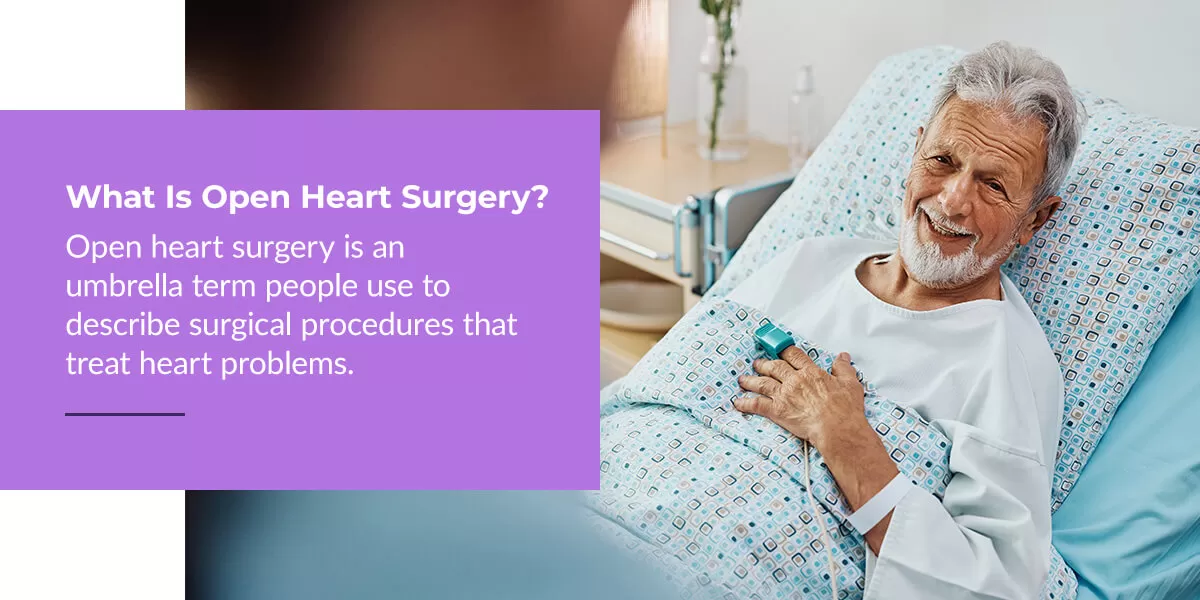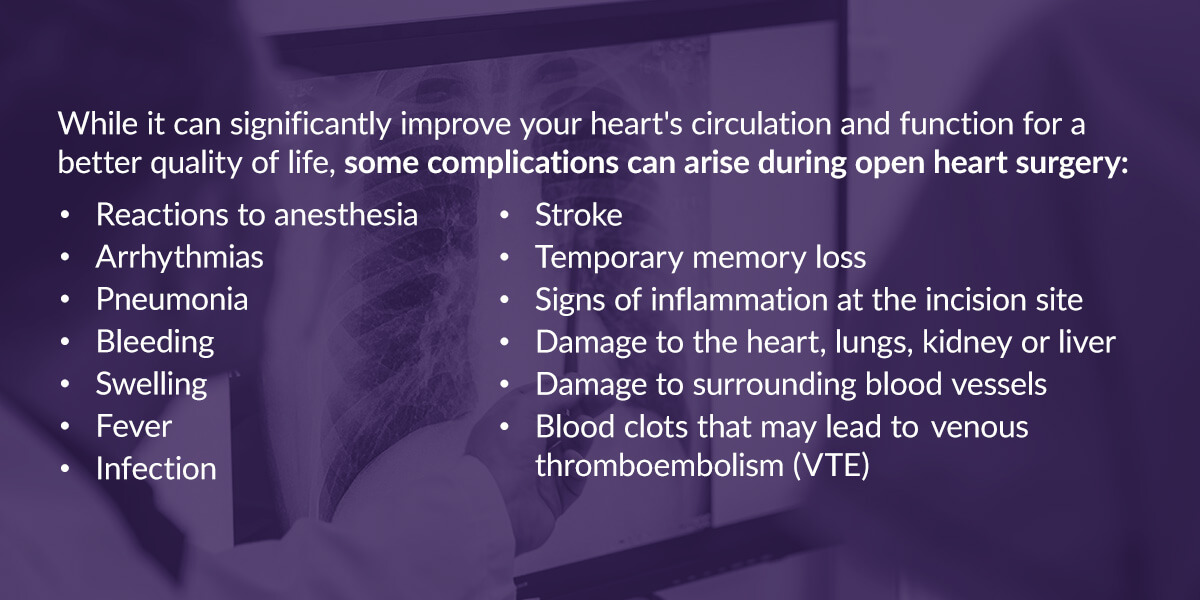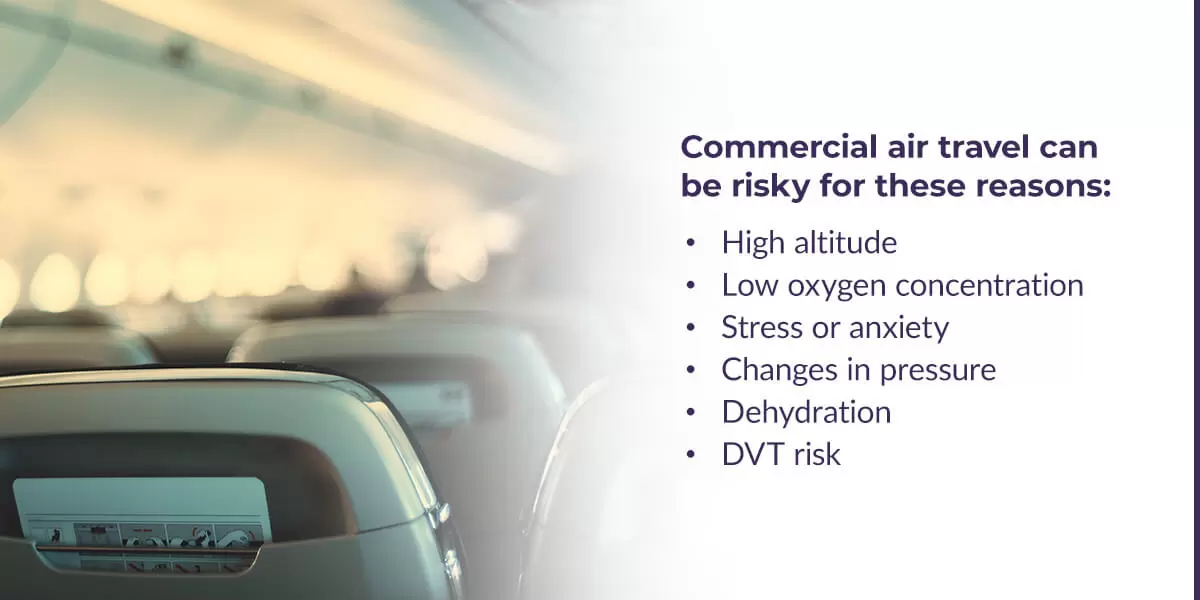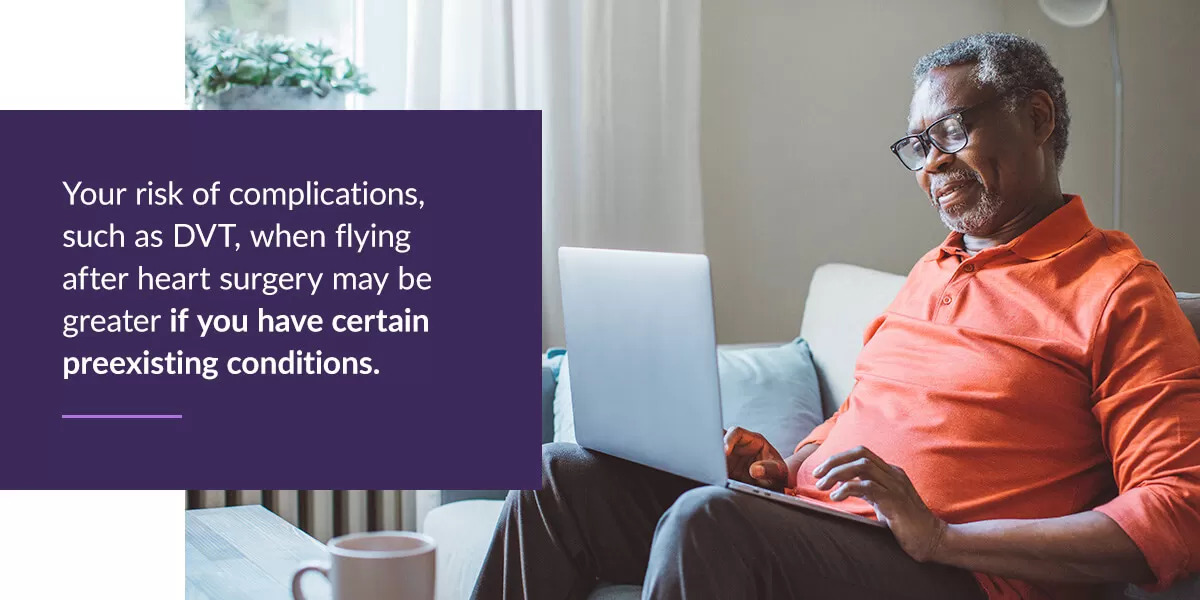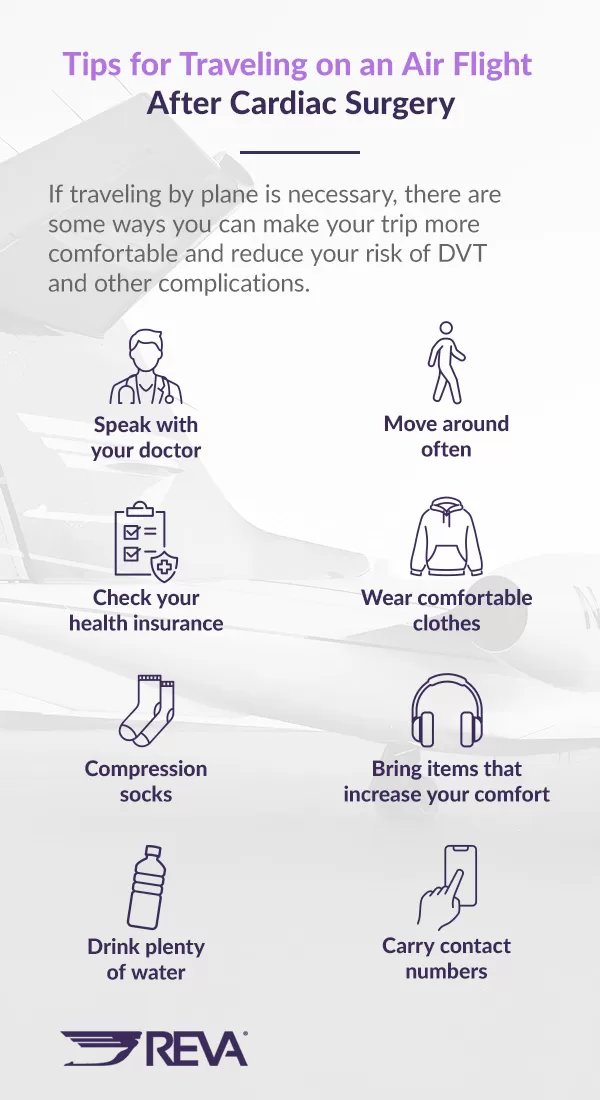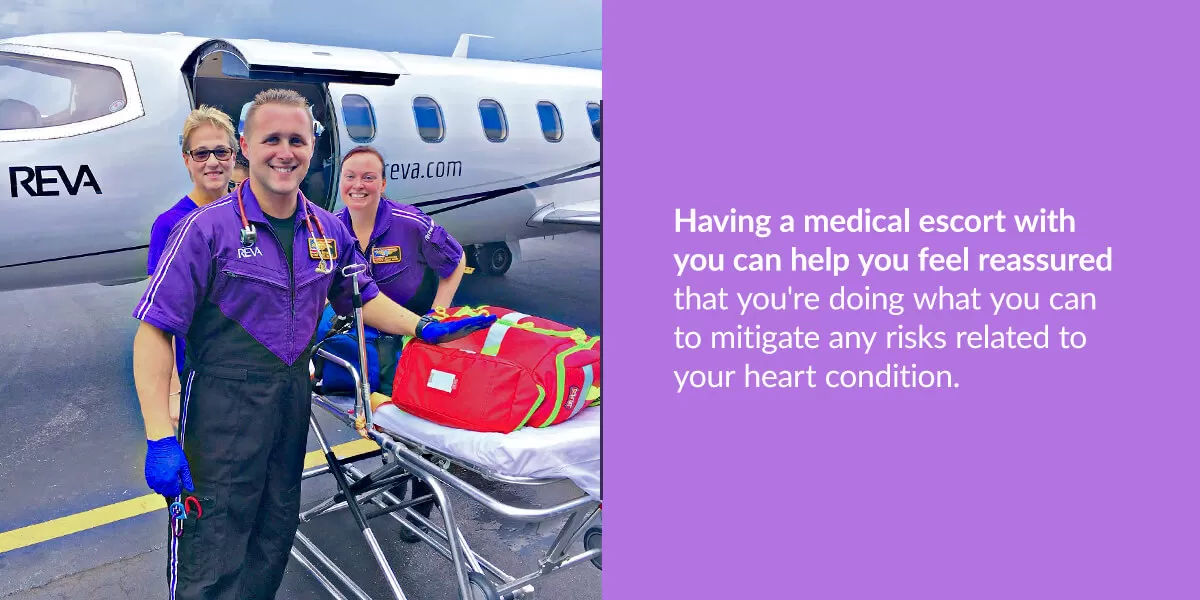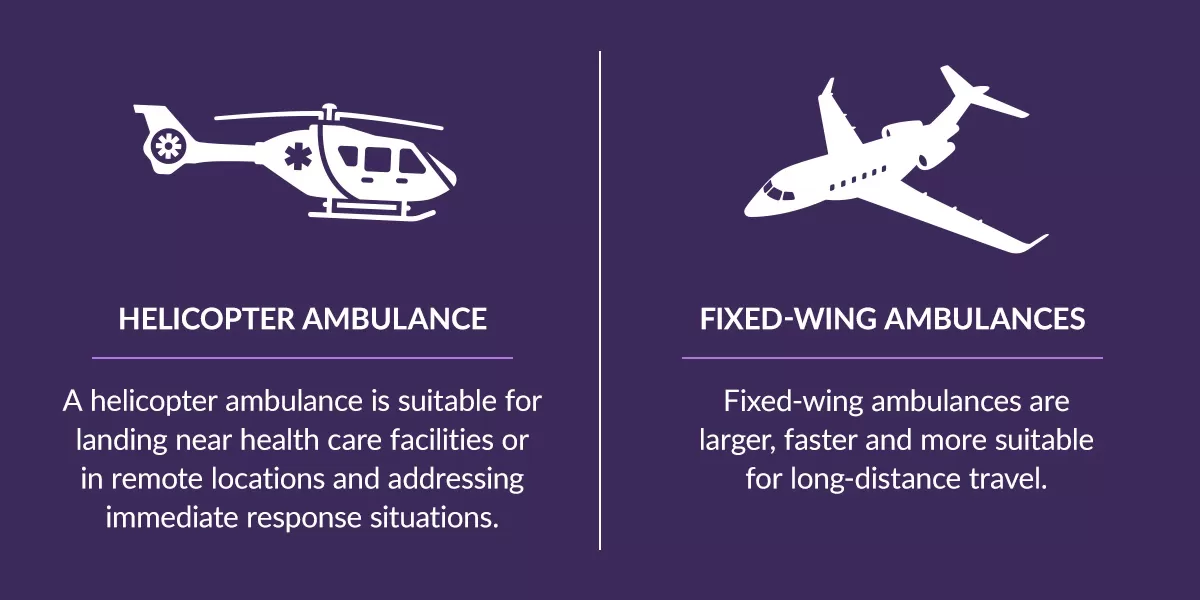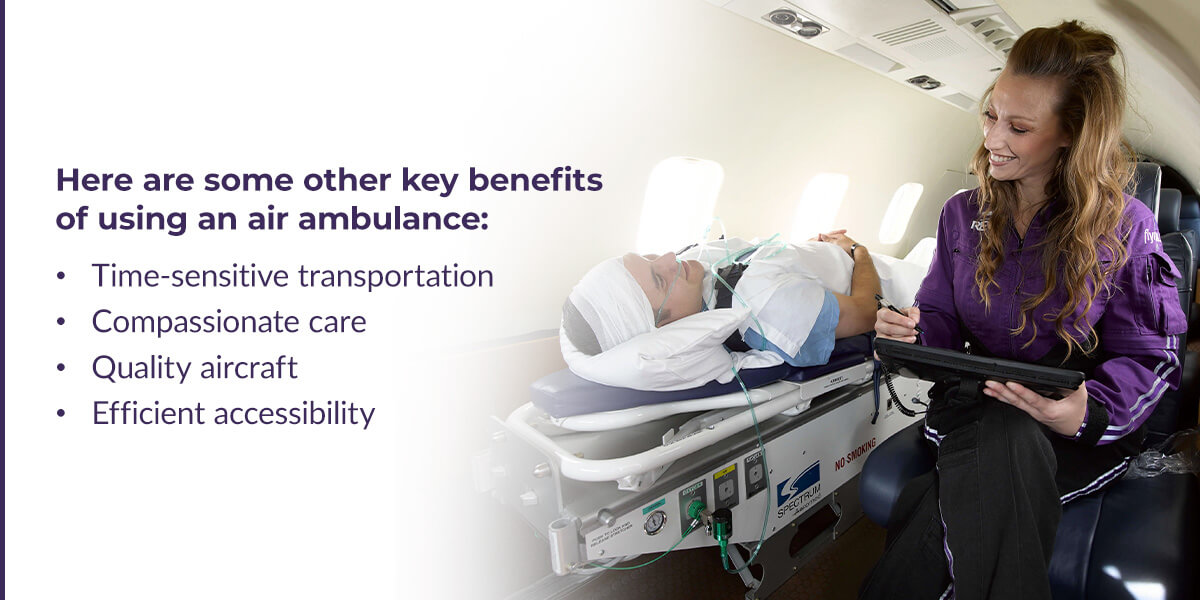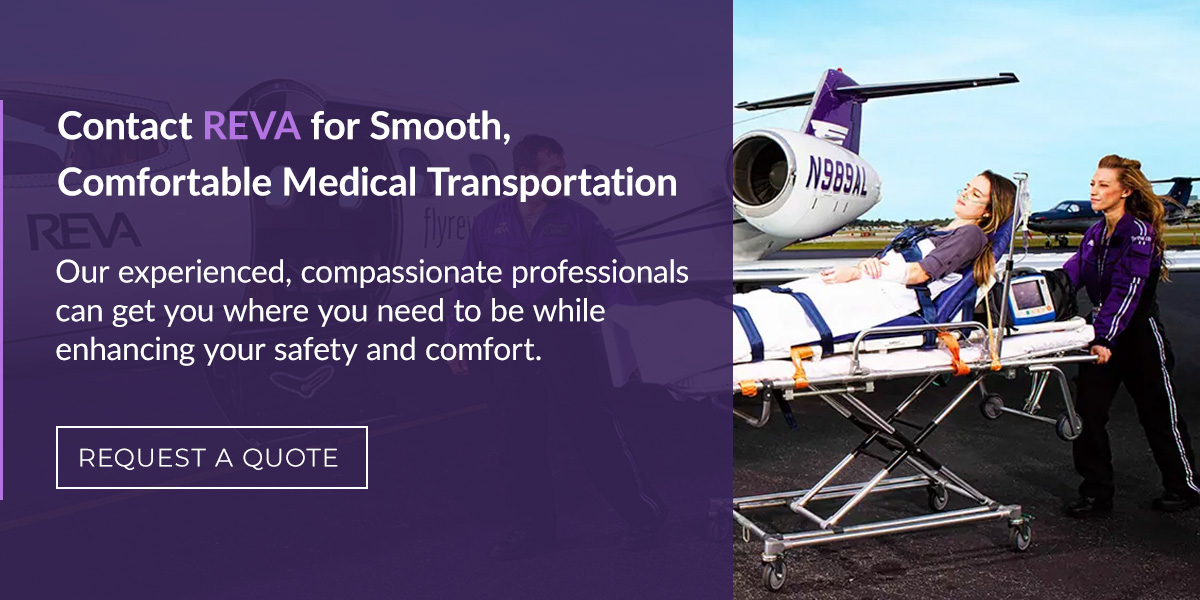Open heart surgery can be minimally invasive or require a long period of recovery. In any case, you or your loved one will likely be in a more delicate state. This means your normal routine, including work, exercise, activities and travel, may not be feasible for several weeks or more. If you have a trip planned in the near future or had your surgery done in another state, traveling by plane can potentially create health complications.
Flying on a commercial airplane is not always recommended for recovering patients, especially those with conditions like diabetes. If you want to know whether it is safe to travel after heart surgery, consider the potential risks of traveling and alternative modes of long-distance patient transportation that are available.
What Is Open Heart Surgery?
Open heart surgery is an umbrella term people use to describe surgical procedures that treat heart problems. This type of surgery typically involves the heart muscle, arteries, valves, aorta and coronary arteries. Open heart surgery gets its name from the nature of the procedure itself, which often requires surgeons to cut through an individual’s breastbone and spread their ribs to perform surgery on their heart. Typically, individuals with heart problems who do not see improvements with medications, lifestyle changes or other procedures may require open heart surgery.
With open heart surgery, surgeons can access the heart to treat the following conditions:
- Coronary artery disease
- Heart valve disease
- Heart failure
- Aneurysms
- Thoracic aortic aneurysm
- Congenital heart defects, such as hypoplastic left heart syndrome or arterial septal defect
- Arrhythmias
- Atrial fibrillation
- Coronary artery bypass graft (CABG)
In some cases, an individual’s heart will be stopped during open heart surgery. If so, they are connected to a bypass pump, or heart-lung bypass machine, during the procedure. This machine acts as the heart and lungs during the surgery, moving blood through the body and providing oxygen to the blood.
However, patients who require less invasive surgery with smaller incisions may have the procedure performed while their heart is still beating. This form of surgery requires smaller cuts between the ribs. Some patients may undergo open heart surgery to repair issues from a heart attack, for a heart transplant or for valve replacement. The type of surgery a heart patient has depends on their unique condition or combination of problems.
Complications and Restrictions After Open Heart Surgery
Having a major medical procedure like open heart surgery comes with the potential for complications. It’s important to know that you may be limited or restricted in what you can do as you recover.
First, there are always risks for any surgery. Heart surgery, in particular, is a complex procedure. While it can significantly improve your heart’s circulation and function for a better quality of life, some complications can arise during open heart surgery:
- Reactions to anesthesia
- Arrhythmias
- Pneumonia
- Bleeding
- Swelling
- Fever
- Infection
- Stroke
- Temporary memory loss
- Signs of inflammation at the incision site
- Damage to the heart, lungs, kidney or liver
- Damage to surrounding blood vessels
- Blood clots that may lead to venous thromboembolism (VTE)
The severity of these risks also depends on the type of heart condition you have and your overall health.
Second, your lifestyle may change during recovery. Depending on the type of surgery you had, you may need to take medication, attend physical therapy, and get plenty of rest as your chest muscles and breastbone heal. This means your typical activities may need to be postponed until you are well enough.
Third, your travel abilities may be limited for several weeks or more. The complications of heart surgery noted above may become a greater risk if you engage in activities that are too strenuous during recovery, such as intense exercise or flying. If you plan on traveling, some airlines may require you to receive a medical clearance certificate from your doctor. This certificate shows that your health care providers “clear” you to participate in certain activities, including flying across long distances.
Your physician or surgeon will assess you via a thorough examination to determine if your condition could worsen by sitting on a plane for several hours. If you have plans to travel after your surgery, it’s important to talk to your doctors about whether you will require medical clearance.
Risks of Flying Too Soon After Open Heart Surgery
Can you fly after heart surgery? Depending on your condition and recovery time, yes. However, being on an airplane for long periods after an invasive surgery can present issues that may have a negative impact on your cardiovascular health, even if you feel OK after surgery. Commercial air travel can be risky for these reasons:
- High altitude: Flying in an airplane may have the same effect on your heart as visiting high-altitude locations. Patients who have certain heart conditions or high blood pressure may be more at risk for complications. Drastic changes in altitude can potentially worsen symptoms of existing heart conditions or lead to other heart events. Being at higher altitudes can put more strain on the heart.
- Low oxygen concentration: Airplanes, which travel at higher altitudes, also have reduced oxygen pressure. Sitting in the airplane cabin for hours means your body may not receive the optimal amount of oxygen, which can pose a risk for those with existing heart conditions like heart disease, CAD and pulmonary hypertension. Because there is less oxygen getting to your lungs on an airplane, your heart has to work even harder to pump blood to the rest of your body.
- Stress or anxiety: It’s common for people to feel general anxiety or stress about flying due to fear of heights or turbulence. Stress or anxiety can make your heart conditions worse or lead to a high heart rate, which may also prolong your recovery process.
- Changes in pressure: Passengers will feel pressure changes as the aircraft cabin altitude increases or decreases. This can cause gas to increase or expand in the body, resulting in pulmonary barotrauma. You may experience chest pain, a bloody nose or shortness or breath, which can lead to serious lung and heart damage if you’re recovering from open heart surgery.
- Dehydration: On long-haul flights, significant changes in fluid balance can occur due to controlled, dry air. Very low humidity can generally lead to faster dehydration, affecting your blood pressure. This can be problematic for those with heart disease, CAD, arrhythmia or heart failure.
- DVT risk: Sitting in a cramped plane cabin requires long periods of immobility and poor circulation. Combined with potential dehydration, you may be at a higher risk of developing a blood clot, which often forms in veins in the legs. This is also known as deep vein thrombosis (DVT). If you have an implanted heart device, artificial heart valve, arrhythmia, CAD or a coronary stent, your risk may be even greater. Blood clots can lead to a stroke or heart attack.
When flying after cardiac surgery, you may experience several of these risks at once, which could worsen the negative effects on your overall health.
Patients Who Are at Higher Risk
Your risk of complications, such as DVT, when flying after heart surgery may be greater if you have certain preexisting conditions like the following:
- Obesity
- Diabetes
- Chronic obstructive pulmonary disease (COPD)
- Kidney disease
- Blocked arteries in the legs
- Anemia
- Heart or lung disease
- History of blood clots
- History of DVT
- Pregnancy
- Being on extended bed rest
- Having a catheter in a large vein
- Recent or current cancer treatment
- Having limited mobility
- Varicose veins
- Use of hormones, such as oral contraceptives or hormone replacement therapy
While some blood clots can dissolve on their own, and travel-related DVT is generally low, some clots can travel to your lungs. This may result in a blockage of blood flow and potentially lead to a pulmonary embolism, which can be fatal.
Your chances of these complications can also depend on your age. For example, older individuals may have a higher risk of developing blood clots than younger patients. People who smoke may also be more likely to experience post-surgical issues. The risks of experiencing complications during open heart surgery may be higher if the procedure is performed during an emergency.
You may receive medication to control your blood pressure or prevent bleeding and infection when flying after open heart surgery. This can reduce your risk of complications.
When Can You Fly After Open Heart Surgery?
How soon after open heart surgery you can fly depends on your doctor’s recommendation about your overall condition and other factors. For example, if you’ve had a minimally invasive cardiac surgery with no complications, you may be able to fly within two to four weeks. For more moderate or intense open heart surgery, such as heart bypass surgery, you may need to wait four to six weeks.
If you had open heart surgery for a serious complication or other conditions that could potentially make certain activities during recovery more risky, you may have to wait six to eight weeks or longer. Every individual is different, but you should expect a minimum of two weeks before you can safely travel long distances. How long you have to wait to fly after open heart surgery also depends on how much you have healed and whether you have conditions that could put more strain on your heart and lungs while flying.
Tips for Traveling on an Air Flight After Cardiac Surgery
If traveling by plane is necessary, there are some ways you can make your trip more comfortable and reduce your risk of DVT and other complications.
- Speak with your doctor: Check that your prescriptions are up to date and that you have enough for your travels. Ask your doctor whether they can provide a letter describing your condition and any medications you currently take, including dosages. Your doctor will likely provide other essential information you need for your flight.
- Check your health insurance: Determine whether you are covered for travel. Some travel insurance policies may cover preexisting conditions like heart disease, but you may have to pay a higher premium. Contact your insurance broker to ensure you have health insurance coverage.
- Bring compression socks: Compression stockings, or high socks that reach just under the knee, can help you avoid blood clots in the legs during prolonged periods of sitting. Compression socks help improve blood circulation and lymphatic drainage in your legs, decrease swelling, and prevent low blood pressure when you stand up after several hours of sitting down.
- Drink plenty of water: Staying hydrated is essential no matter where you are, but it’s especially important during recovery and on a long flight. Because you’re likely to be more dehydrated on an airplane with dry air, be sure to drink plenty of water. Try to avoid coffee, soda, tea and alcohol, as these can dehydrate you more and may interact negatively with your medication.
- Move around often: Though you may not have tons of legroom, try to at least move your legs and feet for a couple of minutes each hour if you’re seated. If possible, walk up and down the aisles or go to the restroom to stretch your legs. Gentle stretching before your flight can also help with improving blood flow.
- Wear comfortable clothes: Wearing breathable, stretchy clothing can make for a better travel experience in general. Women can wear comfortable bras that are not underwired, especially while their breastbone is healing. Wearing tight clothing, like jeans, may restrict your movements on the plane.
- Bring items that increase your comfort: When traveling after heart surgery, you want to have everything you need for a worry-free flight. If you have anxiety about flying, bring headphones, a book or anything that will help make the time go by faster. You may consider getting a breathing pillow for strengthening the diaphragm and supporting optimal diaphragmatic breathing throughout the flight.
- Carry contact numbers: Whether you’re flying with someone else or alone, be sure to have the contact information of a local doctor, surgeon or specialist who knows about your condition and can assist airline employees and medical staff in the event of a complication.
What Are My Options for Flying Before or After Open Heart Surgery?
If you have a severe heart condition and need to travel for surgery or treatment immediately, flying may be your only option. While this is the quickest method, you will need to consider how to safely arrive at your destination before and after your surgery.
If you’re flying on a public commercial flight, you might consider flying with a medical escort. These trained and qualified professionals — who are also called flight nurses or patient escorts — will travel with you to ensure air travel safety. They will also provide any necessary medical care throughout your trip.
Having a medical escort with you can help you feel reassured that you’re doing what you can to mitigate any risks related to your heart condition. Whether you’re traveling short or long distances, a medical escort providing constant medical supervision can bring you peace of mind during emergency or non-emergency situations.
Another alternative is using a mode of private medical transport, like an air ambulance. If your condition is more severe, the risk of you experiencing worsening symptoms or a life-threatening emergency may be greater when flying on a commercial air flight alone. Because commercial flights are not equipped with knowledgeable medical personnel or life-saving equipment, flying in an air ambulance can be a safer way to travel. Private medical transport services can take you safely from bedside to bedside.
Whether you’re traveling to your surgeon or going home post-op, an experienced medical crew will be on board to mitigate health risks and provide medical attention if needed. In an air ambulance, the medical crew can even adjust the cabin pressure to avoid complications. Air ambulances are self-contained critical care units that can keep you comfortable and meet your needs.
How REVA Air Ambulances Can Help
Air ambulances have the technology and medical devices to safely transport you from point A to point B. If you have a heart condition that requires care along the way, an air ambulance can make your experience more comfortable than a private aircraft.
While traveling with a medical escort on a commercial flight can be a suitable option, those who have more severe conditions or prefer to travel with more reassurance and security may find an air ambulance more ideal. You might also need an air ambulance if you:
- Need transportation to a specialized medical facility that is far away.
- Do not have access to public transportation where you reside.
- Are unable to drive yourself or fly unaccompanied due to your heart condition.
- Are flying with a commercial airline that has restrictions on the type of medication or oxygen container you have.
There are a few types of air ambulances that offer different benefits. A helicopter ambulance is suitable for landing near health care facilities or in remote locations and addressing immediate response situations. Fixed-wing ambulances are larger, faster and more suitable for long-distance travel.
Both types of air ambulances come equipped with specialized medical equipment and supplies, much like you would find in an intensive care unit (ICU). Some of this equipment includes:
- Monitoring devices.
- Life support systems.
- A wide range of medications.
You will also find paramedics, doctors and nurses on board your air ambulance who are prepared to handle critical care situations. If it seems like you or a loved one could benefit from safe, tranquil travel on a private air ambulance, know that providing potentially life-saving care is not the only advantage. Here are some other key benefits of using an air ambulance:
- Time-sensitive transportation: In a life-threatening situation, patients need a rapid response. Air ambulances can get medical teams to the individual for quick transport to a specialized facility that they may not receive in a local hospital. A fast response time with a fully equipped aircraft can improve patient outcomes and the chances of survival and recovery.
- Compassionate care: Medical personnel on air ambulances are highly trained and skilled, but they are also dedicated to helping patients before, during and after transport. Loved ones can also be notified of the patient’s health with updates from multi-lingual specialists for clear and consistent communication.
- Quality aircraft: Air ambulances maintain high safety standards, as they are specifically designed to provide medical care for a wide range of injuries and illnesses. Patients will have access to a comfortable and safe environment with high-quality equipment.
- Efficient accessibility: Whether a patient needs to be moved from a mountain to a medical facility or brought back home safely from a foreign country, air ambulances have the capability to quickly transport patients over long distances and access locations that may be too difficult for ground transportation.
Contact REVA for Smooth, Comfortable Medical Transportation
If you need to travel by plane before or after open heart surgery, know that you have options. REVA offers air ambulance and medical escort services that transport you to your destination to mitigate risk. Our experienced, compassionate professionals can get you where you need to be while enhancing your safety and comfort. From critical in-flight medical care to private ground transportation, it’s our goal to help you or your loved one prevent worsening conditions after major surgery.
Traveling with REVA means you can benefit from all the benefits of a private jet along with the latest medical equipment to give you the care you need while flying. At REVA, we offer both domestic and international air ambulance flights, where our friendly medical crew is ready to help you travel to and from treatment. Contact us today to request a free quote for our air ambulance or medical escort services.


